 GENERAL AUDIENCE TODAY
GENERAL AUDIENCE TODAY
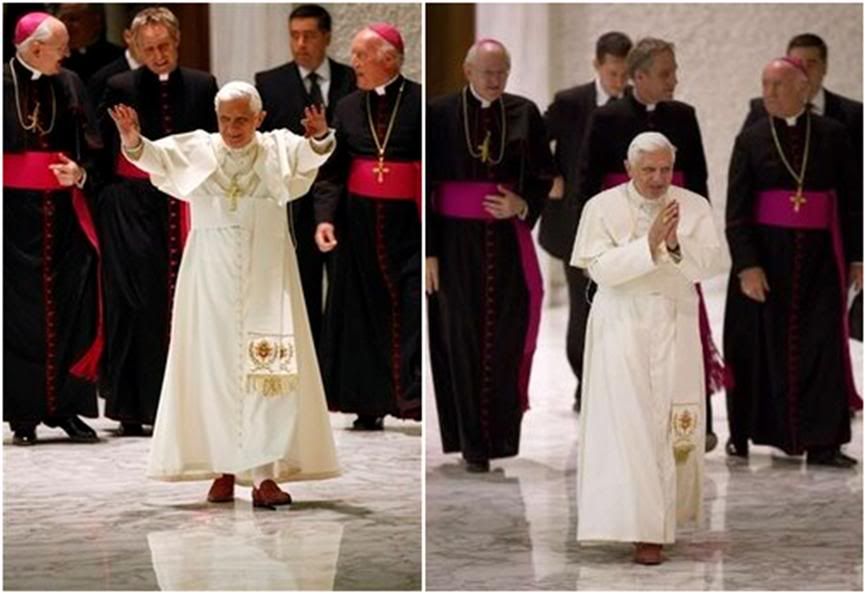
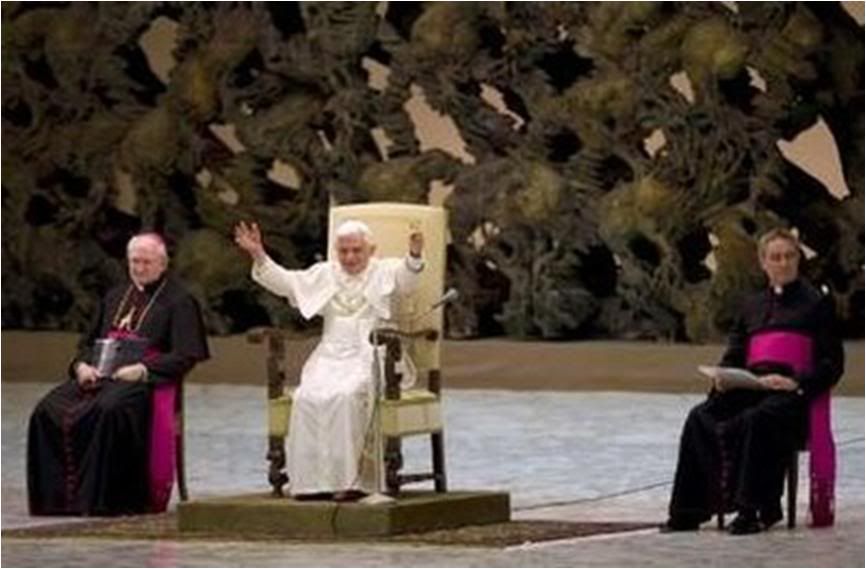
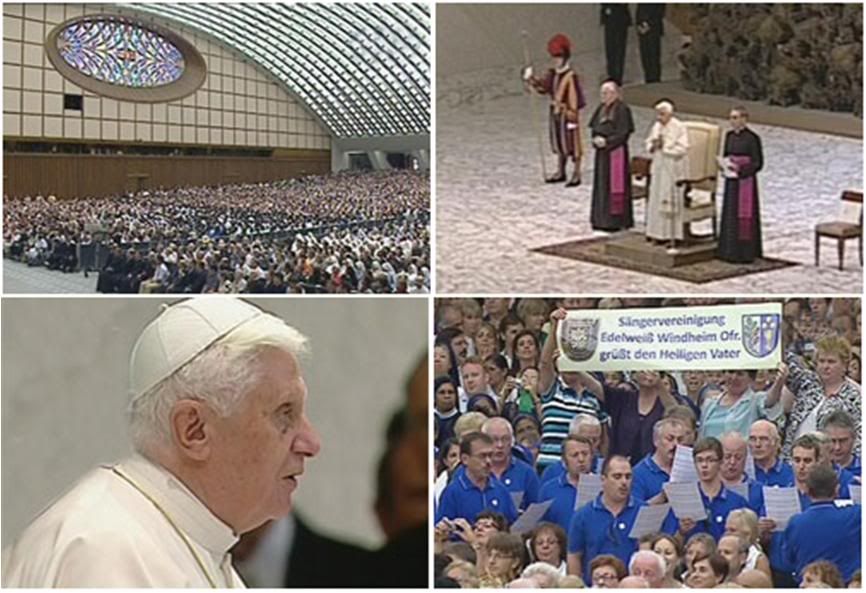 Here is how the Holy Father synthesised his catechesis today:
Here is how the Holy Father synthesised his catechesis today:
Our catechesis today deals with another great monastic figure of the Middle Ages, Saint Odo of Cluny.
Attracted by the Benedictine ideal, Odo became a monk, and later the second abbot, of Cluny. At the beginning of the ninth century, Cluny was the center of an influential movement of Church reform, and Odo, by his example and teaching did much to further this spiritual renewal throughout Europe.
His writings reveal how deeply he was influenced by the monastic virtues of contemplation, detachment from this world and longing for the world to come. Odo was particularly devoted to the Eucharist, emphasizing the real and substantial presence of Christ under the species of bread and wine.
This conviction of faith led him to work for the reform of the clergy and to stress the need for a worthy reception of the Sacrament. An authentic spiritual guide for his troubled times, Odo blended the personal austerity of a great reformer with a constant and joyful contemplation of Christ’s infinite mercy.
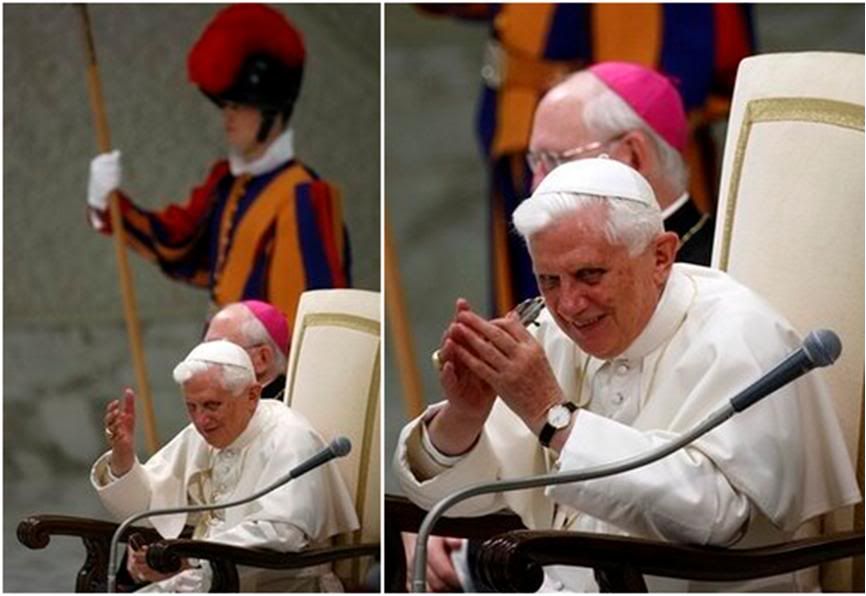
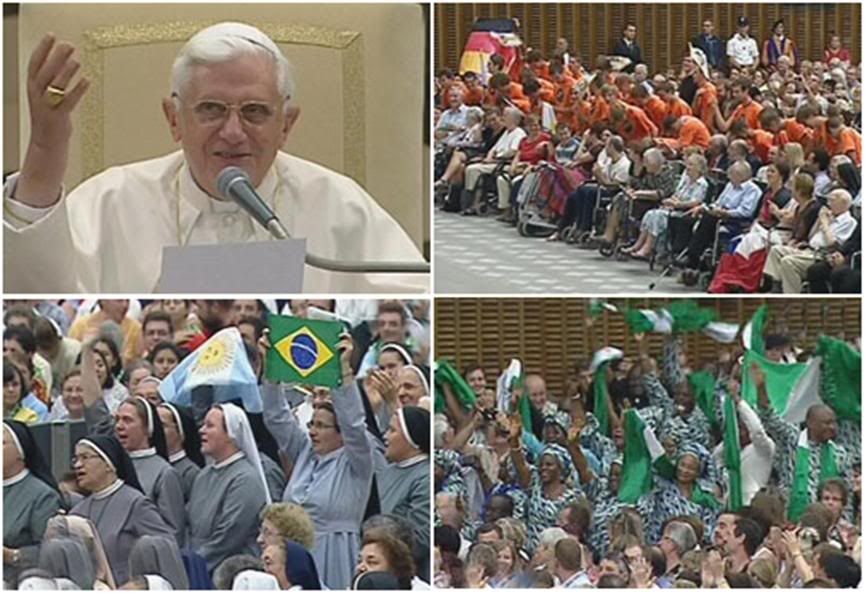 Here is a translation of today's catechesis:
Here is a translation of today's catechesis:
Dear brothers and sisters<
After a long pause, I wish to resume the presentation of great writers in the Church of the East and the West in medieval times, because, as in a mirror, we see in their lives and their writings what it means to be a Christian.
Today, I offer to you the luminous figure of St. Odon, Abbot of Cluny. He is part of that monastic medieval age which saw the surprising diffusion in Europe of Christian life and spirituality inspired by the rule of St. Benedict.
In those centuries there was a prodigious emergence and multiplication of cloisters, with branches throughout the continent, which widely apread the Christian spirit and sensibility.
St. Odon, in particular, brings us to the abbey of Cluny, which in the Middle Ages was among the most illustrious and celebrated, and even today discloses through its magnificent ruins the signs of a past that was glorious for its intense dedication to asceticism, to study, and particularly, to divine worship that was distinguished by decorum and beauty.
Odno was the second abbot of Cluny. He was born around 880, in the area between the Maine and Touraine rivers in France. He was consecrated by his father to Saint Martin, Bishop of Tours, in whose beneficent shadow and memory Odon passed his entire life, until his death near the saint's tomb.
The choice for religious consecration was preceded in him by an experience of a special moment of grace, which he described himself to another monk, Giovanni L'Italiano (John the Italian), who later became his biographer.
Odon was still an adolescent, about 16, when on Christmas Eve, he felt the following prayer come spontaneously to his lips: "My Lady, Mother of Mercy, who on this night gave birth to the Savior, pray for me. May your glorious and singular act of giving birth, o most Pious, be my refuge" (Vita sancti Odonis, I,9: PL 133,747).
The appelative 'Mother of mercy', with which the young Odon invoked the Virgin, would be that with which he would always address Mary, whom he also called "the only hope in the world... thanks to whom the gates of Paradise were opened" (In veneratione S. Mariae Magdalenae: PL 133,721).
At that time, he started to come across the Rule of St. Benedict and to practice some of its observances, "bearing, though still not a monk, the light yoke of monks" (ibid., I,14: PL 133,50).
In one of his homilies later, Odon would celebrate Benedict as "a lantern that shines in the dark state of this life" (De sancto Benedicto abbate: PL 133,725),and calls him 'master of spiritual discipline" (ibid.: PL 133,727).
Affectionately, he points out that Christian piety "honors him with the most sincere tenderness", in the awareness that God elevated him "among the supreme chosen Fathers of the Church" (ibid.: PL 133,722).
Fascinated by the Benedictine ideal, Odon left Tours end enrolled to be a monk in the Benedictine Abbey of Baume, later going on to Cluny, of which he would become the Abbot in 927.
From that center of spiritual life, he was able to exercise a vast influence on the monasteries of the continent. His guidance and reforms benefited the monasteries of Italy as well, among them the Benedictine Abbey in St. Paul outside the Walls.
Odon visited Rome more than once, reaching as far as Subiaco, Montecassino and Salerno. In fact, he was in Rome in the summer of 942 when he fell sick. Feeling that he was nearing his end, he wanted with all his strength to return to his patron St. Martin in Tours, where he died during the Octave of St. Martin on November 18, 942.
His biographer, underscoring Odon's 'virtue of patience', offers a long list of his other virtues, such as his detachment from the world, his zeal for souls, and his commitment for peace in the local Churches.
The Abbot Odon's great aspirations, he said, were concord with kings and princes, observance of the commandments, attention to the poor, education and correction of young people, respect for the old (cfr Vita sancti Odonis, I,17: PL 133,49).
He loved the small cell where he lived, "away from the eyes of everyone, concerned only with pleasing God" (ibid., I,14: PL 133,49). Nonetheless, he did not fail to exercise, as a 'super-abundant spring', his ministry by word and example, even while "lamenting the world as immense misery' (ibid., I,17: PL 133,51).
In just one monk, his biographer observes, all the virtues diffused in various monasteries were found together: "Jesus in his goodness, drawing from the many gardens of monks, created a paradise in one small place, in order to irrigate from its spring the hearts of the faithful" (ibid., I,14: PL 133,49).
In a passage from a sermon in honor of Mary of Magdala, the abbot of Cluny tells us what he thought of monastic life: "Mary, seated at the feet of the Lord, listening attentively to his words, is the symbol of the tenderness of contemplative life, whose flavor, the more it is tasted, more and more leads the soul to detach itself from visible things and the tumult of worldly concerns" (In ven. S. Mariae Magd., PL 133,717).
It is a concept that Odon confirms and develops in his other writings, which show his love for the interior life, his vision of the world as a fragile and precarious reality from which one must uproot onself, a constant tendency to detach himself from things he found to be sources of disquiet, an acute sensitivity to the presence of evil in the various categories of men, and an intimate eschatological aspiration.
This vision of the world may seem rather remote from ours, but Odon's concept, considering the fragility of the world, values an interior life that is open to others, to love of neighbor, thus transforming existence and opening the world to the light of God.
Odon's devotion to the Body and Blood of Christ merits particular attention, one which he always cultivated with conviction, in view of a widespread negligence towards the Sacrament that he actively deplored.
He was firmly convinced of the real presence of Christ in the Eucharistic species, thrugh the 'substantive' conversion of bread and wine into the Body and Blood of Christ.
He wrote: "God, the Creator of everything, took bread, saying it was his Body that he offered for the world, and distributed wine, calling it his Blood", but, he adds, "it is a law of nature that change occurs at the command of the Creator" and that is why "nature immediately changes its usual condition - without delay, the bread becomes flest, and wine becomes blood": at the Lord's command, "substance is transformed" (Odonis Abb. Cluniac. occupatio, ed. A. Swoboda, Lipsia 1900, p.121).
Unfortunately, our abbot notes, this "sacramental mystery of the Body of the Lord, which constitues the entire salvation of the world" (Collationes, XXVIII: PL 133,572), is often negligently celebrated.
"Priests,", he warned, " who come to the altar unworthily, soil the Bread, that is, the Body of Christ" (ibid., PL 133,572-573).
Only he who is spiritually united to Christ can participate worthily in his Eucharistic Body; "otherwise, to eat his body and drink his blood serves for nothing, but is rather a condemnation" (cfr ibid., XXX, PL 133,575).
All this invites us to believe with new force and profundity in the reality of the presence of the Lord - the presence of the Creator among us, who delivers himself into our hands and transforms us, as he transforms the bread and wine, thus transforming the world.
St. Odon was a true spiritual leader for monks as well as for the faithful of his time. In the face of the 'vast multitude of vices' widespread in society, the remedy he proposed decisively was that of a radical change of life, founded on humility, austerity, detachment from ephemeral things and adherence to eternal values" (cfr Collationes, XXX, PL 133, 613).
Notwithstanding the reality of his diagnoses of the situation of his time, Odon did not indulge in pessimism: "We do not say this," he made clear, "in order to cast into desperation those who wish to convert themselves. Divine mercy is always available; it simply awaits the hour of our conversion" (ibid.: PL 133, 563).
He exclaimed: "Oh, the ineffable depths of divine mercy! God pursues sins but he protects sinners" (ibid.: PL 133,592).
Sustained by this conviction, the Abbot of Cluny loved to contemplate the mercy of Christ, the Savior whom he described suggestively as a 'lover of men', amator hominum Christus (ibid., LIII: PL 133,637). Jesus took upon himself the scourges meant for us, he observed, in order to save his creatures who are his work and whom he loves (cfr ibid.: PL 133, 638).
Here we see a trait of the holy abbot which is almost hidden at first glance under the rigor of his reformist austerity: the profound goodness of his soul. He was austere, but above all, he was good, a man of great goodness, a goodness that came from contact with divine goodness.
Odon, according to his contemporaries, radiated around him the joy which overflowed from him. His biographer attests that he had never heard from the mouth of man 'such tenderness of expression" (ibid., I,17: PL 133,31).
His biographer recounts that he would invite the boys he met along the way to sing with him and then gave them little gifts: "His words were full of exultation... his light-heartedness infused intimate joy into our hearts" (ibid., II, 5: PL 133,63).
Thus, this vigorous but amiable medieval abbot, who was an impassioned reformer, nourished with incisive action among his monks but also among the lay faithful of his time, the offer to proceed diligently along the path of Christian perfection.
Let us hope that his goodness, the joy that comes from faith, joined to austerity and opposition to the vices of the world, may touch our own hearts, so that we may find the spring of joy that flows from the goodness of God.
The Holy Father had a special message for the people of Poland:
Yesterday, we remembered the 70th anniversaary of the start of the Second World War. The human tragedy and absurdity of war remain in the memory of peoples. Let us ask God that the spirit of forgiveness, of peace and of reconciliation, may pervade in the hearts of men.
Europe adn the world today are in need of the spirit of communion. Let us construct it on Christ and his Gospel, on the basis of love and truth.
To all of you who are present and to all who constribute to crate am atmosphere of peace, I grant my blessing from the heart.
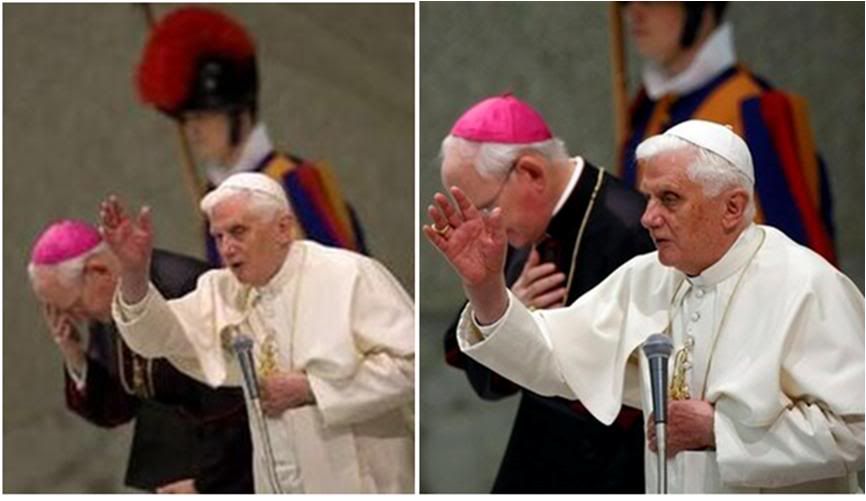 I translated the following report while I was waiting for the Vatican to post the text of the Holy Father's catechesis. And I find to my distress that, despite Mr. Izzo being one of the more conscientious and sensible of Vatican correspondents, his reporting of the Pope's catechesis is in some ways misleading, because he conflates certain concepts together that appear separately in the Pope's text itself.
I translated the following report while I was waiting for the Vatican to post the text of the Holy Father's catechesis. And I find to my distress that, despite Mr. Izzo being one of the more conscientious and sensible of Vatican correspondents, his reporting of the Pope's catechesis is in some ways misleading, because he conflates certain concepts together that appear separately in the Pope's text itself.
A comparison of his report and what the Pope actually says shows the pitfalls into which reporters fall when they try to 'summarize' a text by Benedict XVI by resorting to random citations from his text in a jumble that does not reflect the actual flow of his thoughts.
Howewver, as an Italian journalist, Izzo picks out what must appear to him the most relevant statement in today's catechesis to write his lead.
As I noted earlier, Benedict XVI has always known how to convey messages, directly or indirectly. In today's GA, what he had to say on sin and sinners applies to current events - and personalities - in the eye of controversy.
The Pope at today's GA:
'God pursues sins and protects sinners'
by Salvatore Izzo

VATICAN CITY, Sept. 2 (Translated from AGI) - "God pursues sins but protects sinners" - Pope Benedict XVI today recalled this statement by St. Odon* [Odo, Oddone, Eudes] of Cluny in his catechesis to the General Audience today at the Aula Paolo VI.
[*In my translations, as in the daily 'almanac' of saints that I post, I have taken to using the names of the saints as they are called in their native lands, hence, I use the French form 'Odon' here, rather than Odo (English), Oddone (Italian) and Eudes (Latin).]
The catechesis was dedicated to the French medieval saint, a great Benedictine, follower of St. Martin of Tours, who became the second abbot of Cluny.
Continuing with citations from St. Odon, the Pope said "Divine mercy is always available - it simply awaits our own decision. Loving all men, Jesus took on himself the flagellations which were destined for us".
Paying tribute to "the vigorous but always amiable medieval abbot", the theologian Pope recalled his profound Marian piety, turning to the Virgin as "Mother of mercy, the only hope of the world, thanks to whom the gates of Paradise have opened", as well as Odon's profound faith in the real presence of Christ in the Eucharist, a sacrament that Odon lamented was often "negligently celebrated by unworthy priests who soil the Bread, namely, Christ".
In the face of the 'multitude of vices' widespread in society, St. Odon's 'remedy' to be followed 'decisively' was 'a radical change of life, based on humility, austerity, detachment from ephemeral things, and adherence to eternal values".
The Pope came to the Vatican from Castel Gandolfo for the audience to accommodate the great number of requests for tickets, returning to the summer residence afterwards.
With today's catechesis, he resumed his catechetical cycle on the "great medieval writers of the Eastern and Western Churches".
Nonetheless, the figure of the great St. Odon, who was 'a great spiritual guide for the monks as well as the faithful of his time' appears very relevant today.
"Notwithstanding the realism of his diagnoses, he did not indulge in pessimism but with incisive actions, he nourished in his monks, as well as in the lay faithful of his time, the way of proceeding industriously along the path of Christian perfection".
Through his teaching, said the Pope, St. Odon "was able to exercise a vast influence on the monasteries in all of Europe", with "the surprising diffusion in Europe of Christian life and spirituality inspired by the Rule of St. Benedict".
In this respect, the Pope recalled St. Odon's description of Mary Magdalene "seated at the foot of the Lord, listening to his words attentively", indicating her as an ideal for monastic life which should look at the world "as a fragile and precarious reality distinguished by the presence of evil in the various categories of man".
[The sentence sounds rather non-sequitur. Here is what the Pope said in his text:
"Mary, seated at the feet of the Lord, listening attentively to his words, is the symbol of the tenderness of contemplative life, whose flavor, the more it is tasted, more and more leads the soul to detach itself from visible things and the tumult of worldly concerns.
It is a concept that Odon confirms and develops in his other writings, which show his love for the interior life, his vision of the world as a fragile and precarious reality from which one must uproot onself, a constant tendency to detach himself from things he found to be sources of disquiet, an acute sensitivity to the presence of evil in the various categories of men, and an intimate eschatological aspiration."]
"Concord with kings and princes, the observance of the commandments, attention to the poor, education and correction of the young and respect for the old" along with 'the virtue of patience" were St. Odon's 'great aspirations', and thanks to the 'multiplication of cloisters', Cluny became 'among the most illustrious and celebrated of monasteries for its intense devotion to asceticism, study and divine worship, all carried out in decorum and beauty".
The Pope recalled that "St. Odon's guidance and monastic reforms" also benefited Italian monasteries, among them, the Benedictine abbey at St. Paul's outside the Walls.
Odon visited Rome more than once, going also to Subiaco, Montecassino and Salerno. In 942, he fell ill when in Rome, and decided to return
to his monastery where he died during the Octave of St. Martin.
[The Pope said to 'return to his patron St. Martin of Tours', not to his monastery, so it appears Odon died in Tours, not Cluny, as Izzo reports.]
"Let us hope," concluded Benedict XVI extemporaneously, "that his goodness,the joy that comes from the strength of faith through the austerity of saying NO to the vices of the world, may also touch our hearts".
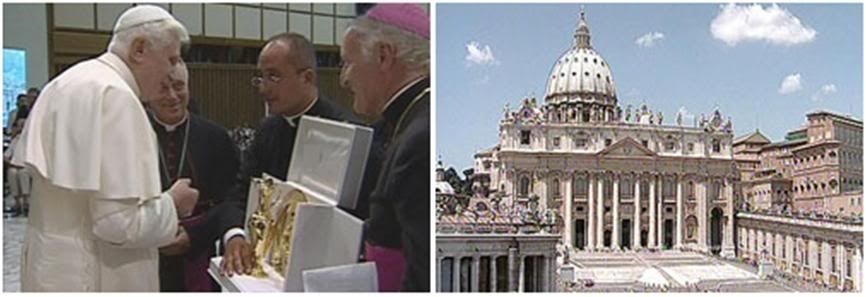
[Modificato da TERESA BENEDETTA 02/09/2009 17:40]